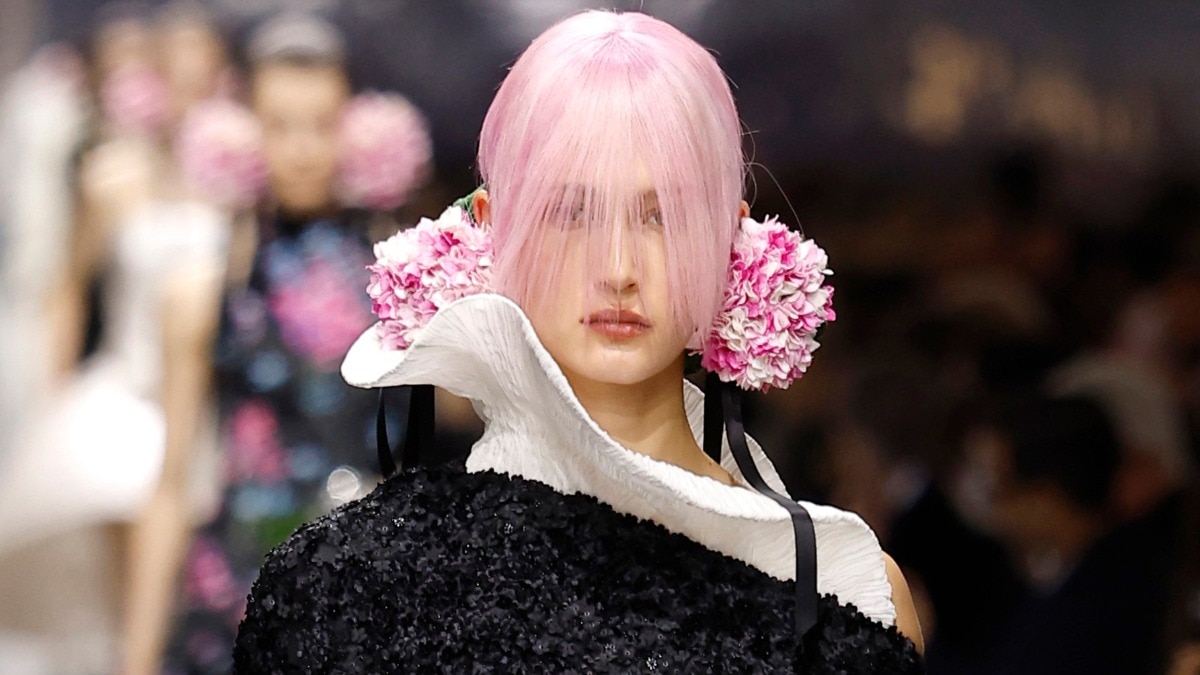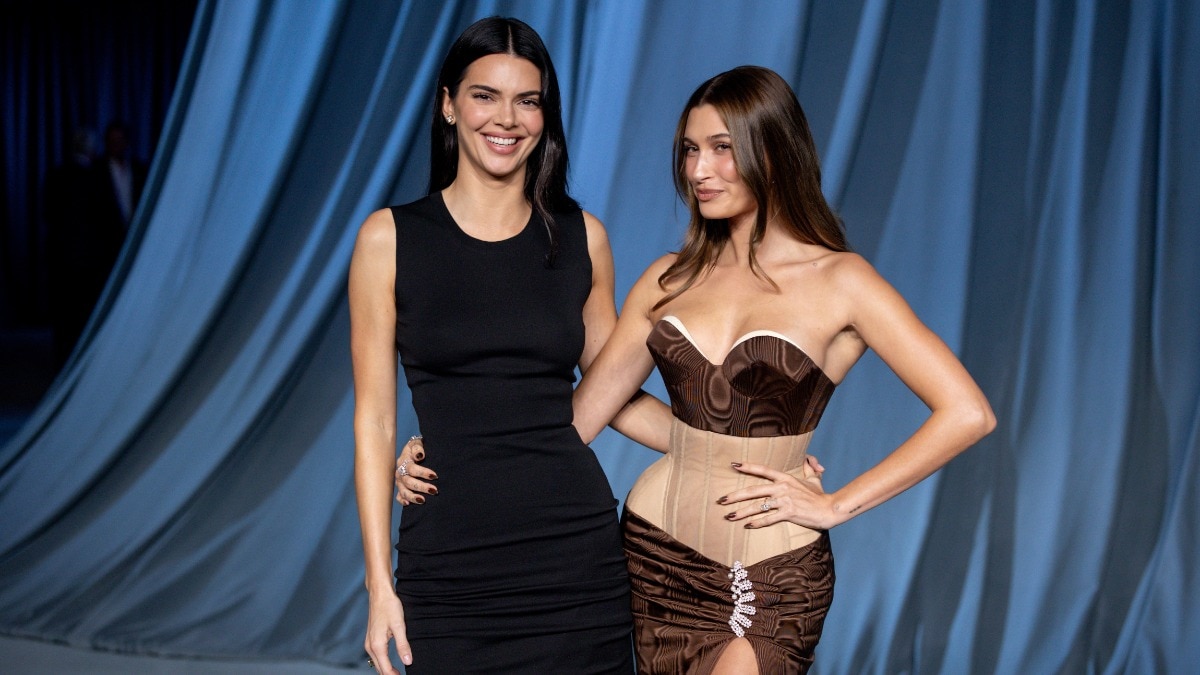How the beauty industry will evolve in 2024
The 10 trends changing the landscape of beauty—from AI-driven innovations to Gen-Alpha influencers, epigenetics, regenerative aesthetics, and more.


Change is the only constant in beauty—and in 2024 technology will accelerate the way we choose and use beauty more than ever. But it’s not only the employment of AI that's evolving beauty trends; so too is climate change, the teens and tweens growing up, and the meeting of mysticism with capitalism. Intrigued? Read on to discover 10 ways in which beauty will shift focus in 2024...
Artificial intelligence will further redefine beauty
Making things more efficient and effective, artificial intelligence (AI) will continue to revolutionise the beauty industry in 2023. Specifically, the growing presence of AI will result in “shifts towards improved personalisation of experiences and interactions, even in a virtual domain,” revered cosmetic doctor and industry trainer for Allergan Aesthetics, Dr Sophie Shotter explains.
Of course, beauty brands have already integrated AI in various ways, “including skin analysis algorithms, personalised skincare routines, and individualised products,” notes Dr Jason Thomson, a dermatologist at custom-made skincare company Skin + Me. This evolving use of AI will continue to benefit customers in finding the right skincare – as well as hair care, nail care and colour cosmetics (take Dcypher, the first fully custom, AI-powered foundation brand, for example). “However, for dermatological conditions, it’s advisable to rely on expert human guidance,” Dr Thomson cautions. Dr Nowell Solish, a dermatologist at Indeed Labs agrees, adding that we’ll see more combined usage of tech and human expertise. “AI helps track changes in the skin over time, aiding in the early detection of skin conditions like melanoma,” he notes, but advises on a combination of AI and professional assessments “for a comprehensive skincare routine and overall accurate idea of your skin’s needs”.
New platform Renude is a great example of such collaboration. Trained to think like hundreds of experts, it can accurately identify a range of skin concerns, assesses overall severity, and create a skincare routine focused on ingredients with multi-brand product recommendations. In addition to the AI-generated results, it connects you with your own aesthetician to answer ongoing questions and evolve your routine as your skin changes.
Viral hair, make-up and nail trends will keep inspiring
If you thought last year’s trend for “ephemeral expression” was exasperated by TikTok (it was ‘latte make-up’ one minute and ‘milk bath nails’ the next), prepare for 2024 to bring us many more viral micro-trends.
To reveal the ingredients, products and techniques that will be big in 2024, Beauty Pie’s research team analysed Google search volume for hundreds of new trends, sharing which ones are seeing the greatest spikes in popularity in the run-up to the new year. And? ‘Ectoin’ is the buzzy skincare ingredient to know, while ‘skin streaming’ (streamlining your routine) is still going strong. The ‘Scandi hairline’ highlighting technique and ‘butterfly bob’ cut will dominate hairstyles, while ‘Cherry cola lips’, ‘espresso make-up’ and ‘chocolate-milk nails’ prove that food-inspired trend names will remain relevant.
We can expect fragrance content to snowball, too: according to Instagram’s 2024 Trend Talk (a data-driven look at Gen-Z trends that will drive global culture in 2024), #perfumetok remains on the rise, with “over a quarter of Gen-Z planning to express themselves by discovering a signature scent in 2024”.
The Gen-Alpha consumer will garner influence
From generation Z to A… Alpha is set to have a huge impact on brands and the economy in upcoming years, say the co-founders of Indu—an entry-point-to-beauty brand created to offer teens a safe space to learn about and care for their skin as well as experiment with make-up.
“Being born between 2010 and 2025 makes the oldest of Gen-Alpha teenagers, and although they do not have purchasing power yet—brands and products are increasingly being tailored for this young generation of future customers,” note Aaron Chatterley and Reena Hammer, the co-founders of Indu. “The culture of today has created a generation of young beauty shoppers and ‘content-worthy’ product seekers, which brands are now tapping into.” Preteen influencers like the Kardashian offspring, namely Penelope Disick and North West, are also setting the next trends, sharing their routines on TikTok, where videos tagged '#generationalpha' have generated nearly 50 million views.
Chatterley and Hammer feel that, rather than overlooking the market—as brands perhaps did with former generations in the past—the beauty industry will focus on formulating products that are authentic to the younger generation’s desires, wants and needs. (See Bubble—available at Boots—for further evidence.)
Body care will boom for two big reasons
Our ‘skinvestments’ no longer stop at our neck: in 2021 the global skincare body product market was valued at $26.93 billion, something that dermatologist Dr Alexis Granite sees as a big focus for 2024—with sales expecting to increase at an annual rate of 5.9 per cent. She points out that “98 per cent of our skin is found below the neck, so it stands to reason that building awareness of caring for skin beyond the face is vitally important”.
It is one way the “snackable wellness” movement will play out next year. Think of this as bite-sized boosts, says Dr Granite, rather than anything overwhelming. “Self-care should never be an added pressure. I don’t want my patients to ever feel that they should or need be doing something, such as—first it was my facial skin and now I have to look after my body skin too?” Beyond beauty, body care can be about eliciting calm or comfort. She explains, “much of this new-found appreciation for body care is about the role fragrance and textures play in helping people to look and feel good about themselves”.
Of course, there are also health and aesthetic benefits to be had, which makes body care all the more appealing. Here, when seeking concern-based products, formulations are important to investigate—especially given how skin is thicker on the body. “Utilising active ingredients to tackle spots on the back, for example, calls for formulations that are able to penetrate the skin effectively while delivering the right concentration of actives,” the dermatologist notes. Expect more specifically formulated body products laden with potent ingredients, as well as those positioned as ‘microbiome-friendly’, such as those by the burgeoning Luna Daily—the brand focusing on microbiome-balancing body care for all skin (even the most intimate).
Emotional beauty will become better understood
As above, the joy of beauty cannot be underestimated now—and is proven by the ‘mind-body axis’, explains Dr Shotter. She relates this to a 2024-forecasted trend coined ‘neuro-glow’, conducted by the market research company Mintel. “The relationship between how we look and how we feel is becoming better understood, and that also goes in reverse… how we feel impacts how we look. I think that interconnectedness between our mental health and our outer appearance will become more and more understood, and equally more and more important.”
Dr Shotter feels that aesthetic interventions should never be approached from a physical-only perspective. “What I love seeing in my patients is how much better they feel after they have a treatment.” Dr Granite agrees: “Joy as a result of treatments is part of what makes my job as an aesthetic dermatologist so fulfilling,” she says.
The exploration of emotional beauty also helps explain the rise in mysticism merging with capitalism. From witchcraft to clairvoyance, cartomancy, crystal healing, numerology and astrology, 58 per cent of people believe in at least one such esoteric discipline (according to a French survey conducted by Ifop), and they increasingly feature in our beauty and wellness routines—on social media and IRL. (Take Argentum Apothecary’s in-store and virtual tarot-inspired fragrance readings, which tap into the energies of different archetypes present within us.)
Making spirituality more accessible, while bringing deeper connections to beauty and escapism to our fraught times—there are many benefits. But be mindful of influencers and beauty brands’ attempts at co-opting ancient practices; we shouldn’t be reliant on products or treatments for happiness—rather prioritise the rituals (whatever they may be) that make us feel good in both body and mind.
Potent plants will update the ‘clean’ beauty conversation
In terms of new product formulations in 2024, “a growing interest in herbalism and botany will supercharge brand and shopper conversations about powerhouse plant ingredients as an update on the ‘clean beauty’ trend,” predicts Lisa Payne, head of beauty trends at Stylus, experts in trends and insights.
“Both humble garden weeds and exotic indigenous herbs will invigorate everything from skin serums and hair masks to lip oils and luxury nail polishes,” she tells us.
Expect to see more “high-performing alternatives to synthetic ingredients (such as retinol) and unsustainable ones (like palm oil) found in healing botanicals”.
Expect constant progress in sustainability
In 2024 “consumers will have an even stronger focus on products that are reusable and recyclable,” notes Zoe Boikou, CEO and founder of Zoeva. Indeed, in a recent report, 69 per cent of people stated that sustainability is more important to them now than it was two years ago. As one of the biggest contributors to waste, “the beauty industry will need to continue to innovate when it comes to the life-cycle of products”. We can expect “constant progress,” according to Forbes.
The booming beauty tech market—forecast to increase continuously over the next five years, reaching a value of around $8.93 billion by 2026—is experiencing a rising call for sustainable solutions. Here, look out for more brands like GESKE German Beauty Tech, which produces products built to last a minimum of 20 years, backed by a 15-year guarantee on top of a standard local warranty.
Meanwhile, waste of imperfectly perfect beauty products will be prevented, too. The so-coined ‘Outnet for beauty’ retail site, Boop, is gaining traction by giving a second chance to excess beauty products—whether they have older formulations or packaging quirks (while being totally safe to use).
Protective personal care will become a priority
Another factor related to the planet: Payne believes that the extreme heat experienced across the globe in 2023 “will supercharge consumer interest in beauty and personal care with a protective edge” next year. “Think sophisticated sun protection and products to help the body and mind adapt to harsh environments.”
Here, UV protection is a particularly exciting category for innovation, “as sun care technology makes it much easier and more pleasant to use every day,” (expect exciting things from La Roche Posay in 2024). While pollution—a big concern for many of us—“will inspire protective products for extreme outdoor environments,” Payne adds. She calls this category “protective me personal care”, which will no doubt evolve alongside the disturbing effects of climate change.
Regenerative aesthetics will ‘biohack’ our skin
Next year, the booming non-invasive procedures space (valued at $60 billion globally, a figure predicted to triple by 2030) will evolve as much as grow. “We’ve witnessed a shift away from anti-ageing to pro-ageing,” says Dr Granite, “and central to this is the concept of regeneration”.
Dr Sach Mohan, founder of Harley Street-based Revere Clinics, agrees: “We are entering an era where beauty treatments are less about surface-level changes and more about meaningful rejuvenation.” The focus is shifting from overly filling faces to the use of technologies that can naturally rejuvenate the skin. “I foresee a future where beauty treatments are less about immediate dramatic changes and more about gradual, sustainable rejuvenation. It’s about a deeper connection with one's own body, using its innate capabilities to restore and renew.”
Options allowing the regeneration of tissue are increasingly available to experts. “We are now able to ‘biohack’ our skin,” says Dr Shotter. Think “treatments like HArmonyCa and Sofwave, which stimulate new collagen formation in the skin, or polynucleotides, which are really reversing degeneration in the body’s tissues”. She feels this is exciting because, as we all want to live longer and healthier lives, this should include optimal skin ageing—“especially as studies recently published show that ageing in the skin (our body’s largest organ) causes ageing in other organs like the heart and the brain”.
The science of epigenetics will supercharge skincare
Talking of biohacking, as we predicted last year, the science of epigenetics is supercharging skincare. Where skin is concerned, epigenetics refers to the ageing caused by external factors, specifically environmental and lifestyle sources of DNA damage. Now, products can help change your gene expression patterns, making your skin act younger. It's why targeted skincare platform Klira offers epigenetic skin typing as part of its bespoke prescription skincare service. But it's something the beauty giants are invested in, too.
With a new platform grounded in pioneering skin-longevity research, Estée Lauder is excelling here. “Longevity is one of the fastest-growing movements in the beauty and wellness industries, with multi-generational consumer interest in biohacking and age-reversal practices at an all-time high,” says Justin Boxford, global brand president of Estée Lauder. In January, the brand will drop its newest innovation, Re-Nutriv UltimateDiamond Transformative Brilliance Soft Crème, which features patented tech promising visible age reversal starting in just 14 days.
Where epigenetics are concerned, we can also expect to see more of the innovative ingredient Sunflower Shoot Extract (SSE) which can help boost levels of NAD+ (a coenzyme central to DNA repair and anti-ageing). Faster acting than skincare powerhouse niacinamide, SSE prevents damage to the skin’s cell batteries when exposed to damaging UVA. You can already find it in Dr Sam’s Flawless Moisture Intense, which launched this year.
Exosomes are another rejuvenating ingredient to watch. “They play a pivotal role in cell communication and tissue regeneration,” explains Dr Solish. Here look out for the plant-based brand EXO|E (available via clinics). Dr Shotter recommends these serum-like products to quash inflammation while stimulating collagen, elastin and hyaluronic acid production in the skin when used in conjunction with facial treatments. Read more about our experience with exosomes here.
This article was preciously seen on harpersbazaar.com/uk on 28th Dec, 2023.
Feature image credit - Pexels.com
Also read: Beauty highlights from this month that you cannot miss
Also read: Why the ‘old money’ bob is 2024’s most coveted haircut










